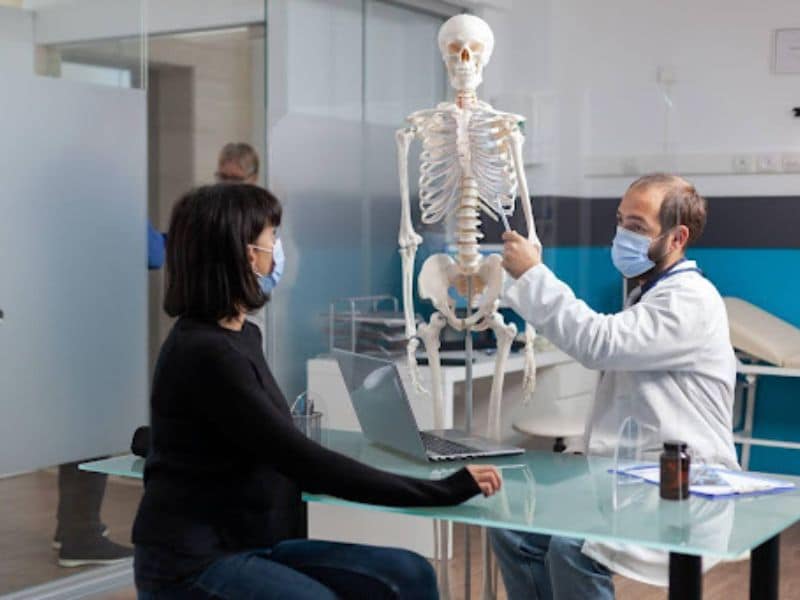
Understanding the Link Between Menopause and Osteoporosis
Menopause and Osteoporosis: What You Need to Know
Menopause is a natural phase in a woman’s life that marks the end of her menstrual cycle. It typically occurs in the late 40s or early 50s and brings about significant hormonal changes. One of the critical health concerns associated with menopause is osteoporosis. In this blog, we will explore the relationship between menopause and osteoporosis, understand why menopause causes osteoporosis, and discuss the cause of osteoporosis in menopause. We will also provide practical tips for managing bone health post-menopause.
What is Osteoporosis?
Osteoporosis is a condition characterized by weakened bones, making them fragile and more susceptible to fractures. The bones become porous, losing density and mass, which can significantly impact a person’s quality of life. This condition is often termed the “silent disease” because it progresses without any symptoms until a fracture occurs.
Understanding the Connection: Menopause and Osteoporosis
Menopause causes osteoporosis primarily due to hormonal changes. Estrogen, a hormone that helps maintain bone density, decreases significantly during menopause. This decline in estrogen levels accelerates bone loss, making bones weaker and more prone to fractures.
1. Estrogen Deficiency
Estrogen plays a crucial role in maintaining bone density by inhibiting bone resorption (the process of breaking down bone). With menopause, the body’s estrogen production drops, leading to increased bone resorption and decreased bone formation, ultimately causing osteoporosis.
2. Increased Bone Turnover
During menopause, the balance between bone resorption and bone formation is disrupted. Bone resorption outpaces bone formation, leading to a net loss of bone mass and density.
3. Calcium Absorption
Menopause also affects calcium absorption in the body. Calcium is essential for bone health, and reduced estrogen levels can lead to decreased calcium absorption, contributing further to bone loss.
Why Does Osteoporosis Occur After Menopause?
The occurrence of osteoporosis after menopause is a result of the interplay between hormonal changes and bone metabolism. Here’s a closer look at why osteoporosis occurs after menopause:
1. Rapid Bone Loss
The first few years after menopause are critical as the rate of bone loss accelerates. Women can lose up to 20% of their bone density within 5-7 years post-menopause.
2. Age Factor
As women age, bone density naturally decreases. The combined effect of aging and menopause-related hormonal changes significantly raises the risk of osteoporosis after menopause.
3. Lifestyle Factors
Lifestyle choices such as diet, physical activity, and smoking also play a role in bone health. Poor nutrition, lack of exercise, and smoking can exacerbate bone loss in postmenopausal women.
Causes of Osteoporosis in Menopause
The cause of osteoporosis in menopause is multifaceted, involving both biological and lifestyle factors. Understanding these causes can help in developing strategies to mitigate the risk.
1. Hormonal Changes
As mentioned, the decrease in estrogen levels is the primary cause of osteoporosis in menopause. Estrogen helps in the absorption and utilization of calcium, crucial for bone health.
2. Genetic Factors
Family history plays a significant role. Women with a family history of osteoporosis are at higher risk of developing the condition after menopause.
3. Nutritional Deficiencies
Insufficient intake of calcium and vitamin D can accelerate bone loss. These nutrients are vital for maintaining bone strength and density.
4. Sedentary Lifestyle
Physical activity stimulates bone formation. A sedentary lifestyle can lead to weaker bones, increasing the risk of osteoporosis.

5. Medical Conditions and Medications
Certain medical conditions (such as rheumatoid arthritis) and medications (such as corticosteroids) can also contribute to the development of osteoporosis in postmenopausal women.
Managing Osteoporosis After Menopause
While osteoporosis after menopause is a significant concern, there are various strategies to manage and mitigate its impact. Here are some effective measures:
1. Calcium and Vitamin D
Ensure adequate intake of calcium and vitamin D through diet and supplements. Foods rich in calcium include dairy products, leafy greens, and fortified foods. Vitamin D is essential for calcium absorption and can be obtained through sunlight exposure and supplements.
2. Exercise
Regular weight-bearing and muscle-strengthening exercises can help maintain bone density. Activities such as walking, jogging, dancing, and resistance training are beneficial.

Read More: The Ultimate Guide to Exercise During Menopause
3. Healthy Diet
A balanced diet rich in fruits, vegetables, lean proteins, and whole grains supports overall health and bone strength.
4. Avoid Smoking and Limit Alcohol
Smoking and excessive alcohol consumption can increase bone loss. Quitting smoking and moderating alcohol intake can help preserve bone health.
5. Medications
There are medications available to treat osteoporosis, such as bisphosphonates, hormone replacement therapy (HRT), and selective estrogen receptor modulators (SERMs). Consult with a healthcare provider to determine the best treatment options.
6. Regular Bone Density Tests
Monitoring bone density through tests can help in the early detection and management of osteoporosis.
Additional Tips for Managing Osteoporosis Post-Menopause
Managing osteoporosis after menopause requires a holistic approach that combines medical treatment with lifestyle modifications. Here are additional tips to help you maintain strong and healthy bones:
1. Balance Training
Engage in exercises that improve balance and coordination, such as tai chi or yoga. These activities can reduce the risk of falls, which can lead to fractures in individuals with osteoporosis.
2. Monitor Bone Health
Keep track of your bone health by scheduling regular check-ups with your healthcare provider. Bone density tests, such as dual-energy X-ray absorptiometry (DEXA), can help monitor changes in bone density and guide treatment decisions.
3. Consider Supplements
In addition to calcium and vitamin D, other supplements like magnesium, vitamin K2, and omega-3 fatty acids can support bone health. However, consult with a healthcare provider before starting any new supplements.

4. Stay Hydrated
Adequate hydration is essential for overall health, including bone health. Drink plenty of water throughout the day to support your body’s functions.
5. Stress Management
Chronic stress can negatively impact bone health. Practice stress-reducing techniques such as mindfulness, meditation, deep breathing exercises, or engaging in hobbies you enjoy.
6. Sleep Quality
Ensure you get enough quality sleep each night. Poor sleep can affect hormone levels and overall health, potentially impacting bone health.
7. Educate Yourself
Stay informed about osteoporosis and menopause by reading reputable sources and attending educational workshops or seminars. Knowledge is a powerful tool for managing your health.
Final Takeaway
Understanding the link between menopause and osteoporosis is crucial for women approaching or undergoing menopause. The hormonal changes during this period significantly increase the risk of osteoporosis, but with the right knowledge and proactive measures, it is possible to manage and mitigate this risk. By maintaining a healthy lifestyle, ensuring adequate nutrition, and seeking medical advice, women can protect their bone health and improve their quality of life.
Understand your risk factors and get tailored advice. Download the Miror app to consult with orthopedics who specialize in menopause-related bone health.
Take the first step towards a healthier, stronger future.
Citations

Sruthakeerthi Shenoy





